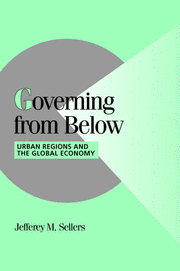
-
Select format
-
- Publisher:
- Cambridge University Press
- Publication date:
- 14 January 2010
- 04 March 2002
- ISBN:
- 9780511613395
- 9780521651530
- 9780521657075
- Dimensions:
- (228 x 152 mm)
- Weight & Pages:
- 0.709kg, 420 Pages
- Dimensions:
- (228 x 152 mm)
- Weight & Pages:
- 0.59kg, 422 Pages
You may already have access via personal or institutional login
Book description
Throughout the world more policy making and the politics that shape it take place in the urban regions where most people live. This book draws on eleven case studies of similar but disparate urban regions in France, Germany and the United States from the 1960s to the 1990s. It documents the growth of this urban governance and develops a pioneering analysis of its causes and consequences. It traces the origins to the expansion and devolution of policy making, to local business mobilization and institutional interests in high-tech and service activities, and the incorporation of local social movements. Nation-states shape the possibilities for this urban governance, but operate increasingly as infrastructures for local initiatives. Where urban governance has succeeded in combining environmental quality and social inclusion with local prosperity, local officials have built on supportive infrastructures from higher levels, the local economy, civil society, and favourable positions in the global economy.
Reviews
‘… this is an important book …'
Source: Progress in Human Geography
'Sellers' book will make a useful addition to the burgeoning literature that critiques hyper-globalist interpretations of globalization. … an interesting read and one that raises questions over how relationships of governance are constituted in different spatial contexts.'
Source: Royal Geographical Society
Contents
Metrics
Altmetric attention score
Full text views
Full text views help Loading metrics...
Loading metrics...
* Views captured on Cambridge Core between #date#. This data will be updated every 24 hours.
Usage data cannot currently be displayed.
Accessibility standard: Unknown
Why this information is here
This section outlines the accessibility features of this content - including support for screen readers, full keyboard navigation and high-contrast display options. This may not be relevant for you.
Accessibility Information
Accessibility compliance for the PDF of this book is currently unknown and may be updated in the future.


